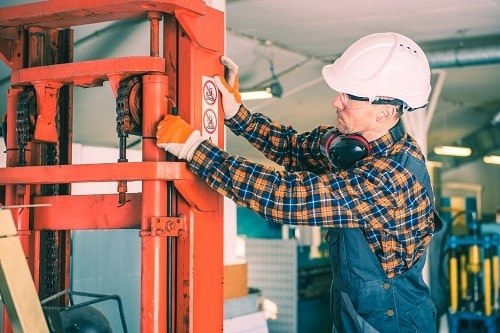Logistics managers are urged to seek total clarity in forklift safety examinations, after it was revealed that lift trucks are involved in 50 per cent more serious accidents than large good vehicles.
Features
The MOT for the forklift truck
Although forklift trucks are not subject to an MOT, as Heavy Goods Vehicles (HGV) are, they do require a Thorough Examination under both Lifting Operations and Lifting Equipment Regulations 1998 (LOLER) and Provision and Use of Work Equipment Regulations 1998 (PUWER) requirements, so the importance of carrying out this examination to the highest standard is critical to the industry and all those working in it.
The lack of clarity surrounding how often lift truck examinations are carried out and documented can leave managers confused – potentially placing employees at risk.
 Forklift trucks must be inspected to high standards. Photograph: iStock/peterscode
Forklift trucks must be inspected to high standards. Photograph: iStock/peterscode
At the recent National Fork Lift Safety Conference, HSE revealed there are around 1,300 serious forklift accidents each year – 50 per cent more than HGVs, therefore organisations need to ensure their lift trucks are inspected to a safe, rigorous standard satisfying both LOLER and PUWER requirements – and to treat the issue as seriously as inspecting vehicles on the road.
Every logistics or transport manager worth their salt knows exactly how their HGVs and public service vehicles (PSV) are inspected and maintained. But the truth is, your lift truck is far more likely to be involved in a lifechanging accident, and have its inspection regime questioned by HSE.
Ironically, satisfying the forklift Thorough Examination duties is far easier than for HGV inspections. Whereas HGVs need to undergo an annual MOT and formal programme of PUWER safety checks, the CFTS Thorough Examination for lift trucks covers LOLER and PUWER in one quality-assured process.
What’s more, if the Thorough Examination is carried out by an experienced lift truck specialist, you can have any faults fixed there and then – instead of waiting for a retest. For employers, that means fewer disruptions and lower maintenance costs.
The fact that HGVs are so well-inspected goes to show the benefit of absolute clarity around standards, schedules, methods and documentation, which is why BITA
and the FLTA, the forklift industry’s two leading authorities, teamed up to create CFTS in the first place.
Established in 2004, Consolidated Fork Truck Services (CFTS) is the forklift truck industry’s own voluntary standard for Thorough Examination. Accredited providers sign up to a code of conduct and standard inspection methodology, satisfying both LOLER and PUWER standards.
Its banner covers a programme of engineer and management training, plus the mechanism to monitor vehicle inspection standards. Companies accredited to the scheme – more than 400 in the UK – can be identified via the distinctive CFTS ‘kite’ certification mark.
So, it is about time that companies look into this easy way to examine the equipment and reduce the number of avoidable accidents involving forklift trucks.
More information on PUWER here
More information on LOLER here
More information on Thorough Examination here
Geoff Martin is Chairman of CFTS
FEATURES

Turning sustainability compliance into business opportunity
By Alastair Loasby, Saffery LLP on 27 February 2026
Businesses that publicly demonstrate good sustainability performance can reap financial, reputational and other benefits, but it’s important to minimise the cost of any reporting on sustainability issues and to focus efforts on improving aspects of sustainability where the benefits outweigh the costs.

How to mitigate the hearing loss cost escalation tsunami
By Peter Wilson, Industrial Noise and Vibration Centre (INVC) on 06 February 2026
Employers need to adopt the latest and most effective noise risk evaluation and management measures, or face rapidly-rising compensation claims for noise-induced hearing loss at work.

Young drivers and work-related road risk: why employers must act now
By Simon Turner, Driving for Better Business on 06 February 2026
Young drivers have a higher risk of being involved in road collisions due to factors such as their inexperience, so when employing them to drive for work, it is vital they receive the right support to help them grow into safe professionals behind the wheel.



